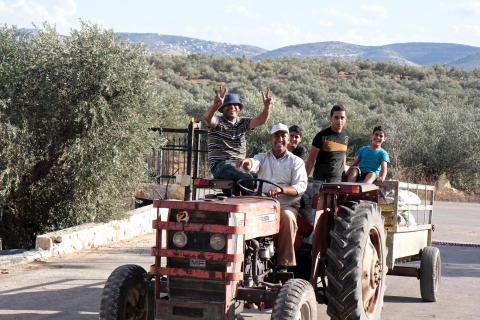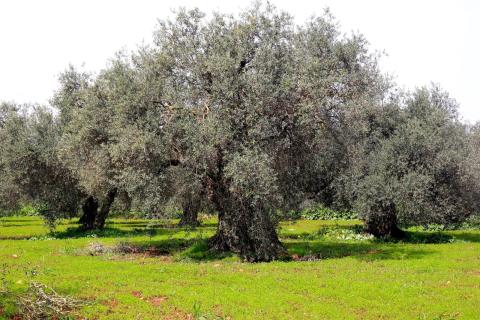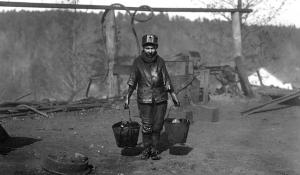
Generations of families have harvested and tended to the same thick-trunked olive trees for thousands of years, sharing their fruits with people around the world through liquid gold: olive oil.
Canaan Palestine now cultivates this heritage for small-scale farmers in Palestine, selling their Fair Trade and soon-to-be Regenerative Organic Certified olive oil to help them reach international markets. Canaan Palestine and the Palestine Fair Trade Association founder Nasser Abufarha, PhD, was inspired by the burgeoning Fair Trade coffee movement’s efforts to bring fair wages to coffee farmers, create more transparent supply chains, and educate US drinkers on their daily cup of joe. Dr. Abufarha wondered how he could bring this concept back to Palestine—and the answer was Canaan Palestine.

Twenty years later, the company has grown to export to over 12 countries. It has also been a member of Green America’s Green Business Network since 2007, working with over 2,000 family farms across 52 different villages to bring delicious olive products to market.
Fatin Zahra, business market manager at Canaan Palestine, says that the cultivation of the olive groves is a wisdom that has been passed down for generations—of course it is organic and regenerative, because it is older than industrialized forestry.
“The majority of trees are hundreds of years old—and those are the youngest trees! I’ve seen many that are two thousand, three thousand years old. It’s beautiful to think that these trees continue to feed families and people around the world every single year,” says Zahra.
Canaan Palestine cares for these ancient trees and produces their olive goods while navigating significant barriers, however. Settlements are encroaching on the olive groves, sometimes taking them over entirely or erecting checkpoints that prevent farmers from accessing them.
“Many olive trees are being chopped and destroyed to make way for expanding and new settlements, bypass roads, and ‘security zones,’” says Zahra.

While Canaan Palestine is headquartered in the occupied West Bank, the effects of the ongoing hostilities and violence in Gaza have been disastrous. Traditionally, the olive harvest starts in October, but last year’s celebration of Palestinian heritage and food was cut short by renewed armed conflict between Hamas and the Israeli military, resulting in an immense loss of life and threatening livelihoods throughout the region.
Dr. Abufarha told Al Jazeera that since October, the ongoing assaults on Palestinian communities beyond Gaza have led to the worst olive harvest in living memory. Farmers have faced more restrictions on their movements from Israeli occupation forces, he says, along with threats and harassment from settlers themselves.
Zahra says that Green Americans can support Canaan Palestine by purchasing products online from Canaan Palestine or through their 500+ retail partners across the US like Whole Foods Market and local artisanal shops. Zahra also stresses the impact of supporters speaking out for an end to the conflict. Actions such as calling elected representatives to demand a permanent ceasefire and advocate for humanitarian aid can both affect policy and also show those like Canaan Palestine that they are heard and supported.
“Everybody I talk to is just feeling so much hope that people in the US, especially the young ones, are so open-minded and aware and understand the truth of what’s happening,” Zahra says. “All of us are incredibly thankful for it.”







